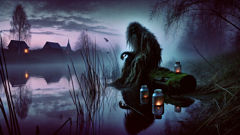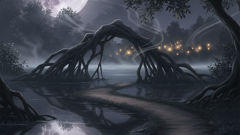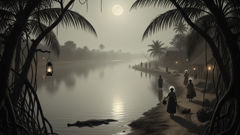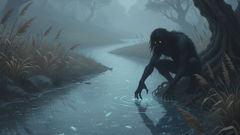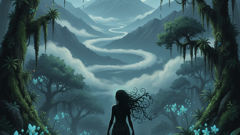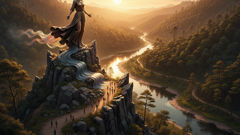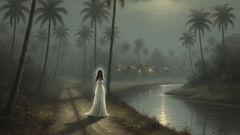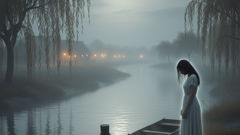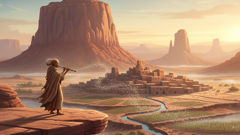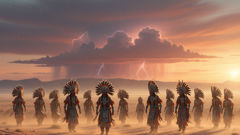Introduction
Where the Volga’s currents ripple wide and deep, and the silver mists drift low across the reedy banks, a brooding stillness settles as dusk falls. The river’s breath is cold and old, whispering secrets in a voice that only the wind and the willows seem to understand. Here, in the heart of 19th-century Russia, life is shaped by the rhythms of the water. Men fish and ferry, women wash linens at dawn, and children chase dragonflies along the muddy shore—each keeping a wary distance from the shadowy pools near the old mill, where the surface is slick as glass and nothing stirs but the reeds. In this place, every soul knows the name of the Vodyanoy. They say he sits hunched upon his sodden log, green with algae and thick with muck, beard dripping like a curtain of riverweed, eyes as pale as morning fog. He is the river’s keeper, a spirit as old as the stones, and his realm is not to be trespassed lightly. The village elders warn that he hoards the souls of the drowned in porcelain jars, hidden beneath his underwater palace of sunken timbers and broken dreams. And yet, for all their caution, there are always those who tempt fate—who linger too long by the water’s edge, or curse the spirit’s name when a net comes up empty. For the Volga gives and the Volga takes, and in the heart of every tale is a question: is it the river’s will, or the Vodyanoy’s, that decides who is spared and who is lost? This is the story of such a reckoning, when grief, defiance, and the secrets of the deep entwined one fateful autumn, and the legend of the Vodyanoy became flesh and fear along the haunted banks of the river.
The Unquiet River
The village of Staroye Ustye lay crouched on the river’s edge, half-hidden by tangled birch and willow groves. Its houses were patched with wood from forgotten shipwrecks, their windows fogged by damp and the wary gaze of their occupants. Old Petrovna, the midwife, could measure the days by the sound of oars clapping water at dawn. She remembered each face lost to the Volga, each small bundle of flowers cast onto the tide for remembrance. Her warnings grew sharper every year, as if repetition alone could keep calamity at bay: “Don’t whistle after dark; the Vodyanoy listens. Don’t cross the old bridge at night; he waits beneath.”
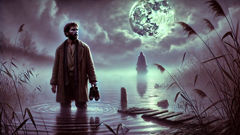
But grief is a hungry thing, and sometimes it devours fear. This autumn, after the equinox, Ivan Morozov found himself standing at the river’s edge in the damp half-light, boots sinking into black mud. His son Kolya had been taken weeks before—a sudden flood, a missing boat, and then only silence. Ivan’s wife, Vera, moved through their home like a shadow, her eyes fixed on horizons only she could see. The villagers left offerings at the water’s edge—milk, bread, coins—but Ivan’s heart burned with a rage the old superstitions couldn’t soothe. He would find Kolya’s soul, or else drag the Vodyanoy from his lair and make him answer for his cruelties.
Each evening, Ivan wandered the shore, collecting driftwood and muttering half-remembered prayers. He studied the currents and the strange patterns they wove among the rocks. One night, when the river’s surface gleamed like oil, he saw something move—a brief glint of white beneath the reeds. A shiver ran through him, but he pressed on, drawn by something colder than fear. He found a small, waterlogged shoe caught in a tangle of roots. His knees buckled. Above him, the moon blinked through clouds, a pale coin tossed into a bottomless well.
The village, meanwhile, grew restless. Stories swirled like leaves on the current. Fishermen returned with tales of strange laughter echoing from under the bridge; a milkmaid claimed to have glimpsed a pale hand beckoning from beneath the weir. Petrovna mixed her herbs with trembling hands and forbade her grandchildren to set foot near the water after sundown. The old men argued in hushed voices about whether the Vodyanoy was angered by some offense—a broken oath, a stolen fish, or the new church bell that clanged too boldly at noon.
Yet Ivan would not be deterred. He crafted charms from rowan branches and pressed them into his coat. He visited the crumbling chapel, lighting candles for the dead and for those he still hoped to save. Each night, his path led him back to the river, where the air tasted of silt and secrets, and the wind carried fragments of lullabies and lamentations. He thought he heard Kolya’s voice sometimes—just a ripple in the reeds, a splash that echoed with unbearable hope.
The deeper Ivan ventured into his obsession, the more the villagers turned away. Old friends crossed themselves when he approached. Vera, silent and pale, pleaded with him to stop, to let the dead rest. But Ivan was already marked by the river, his fate tangled with its dark heart. The Vodyanoy was watching, they whispered. And no mortal who sought his realm ever returned unchanged.
The Bargain Below
On a night when the sky churned with thunder and rain beat down in silver veils, Ivan made his choice. He filled his pockets with stones, wrapped a length of rope around his waist, and trudged to the old mill, where the water ran deepest and the willow roots curled like fingers into the current. Lightning splintered the clouds, painting the world in blue and bone. He spoke no prayers as he stepped into the river—only a curse, spat through clenched teeth: “Vodyanoy, come claim your due!”
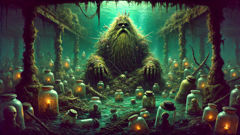
The river closed over his head. Cold and heavy, it pressed him down, down, until sound vanished and only his heartbeat remained. He fought for breath but tasted only silt. Then—impossibly—his eyes opened to a world transformed. He was not dead; he was drifting through a realm of impossible green light, where currents coiled like snakes and drowned timbers rose from the gloom. All around him, jars gleamed on ruined shelves: delicate porcelain, etched with symbols he could not read, each glowing faintly from within.
A shape moved at the edge of vision. Ivan’s pulse hammered. The Vodyanoy appeared—a monstrous thing, larger than any man, his skin mottled and swollen like rotting wood. Algae dripped from his tangled beard; his eyes were bottomless and cold, yet hungry with curiosity. He spoke in a voice like bubbling mud: “Why trespass, mortal? Why barter breath for sorrow?”
Ivan’s fear was a thin thread, but his rage was thicker. “You took my son. Give him back.”
The spirit laughed—a gurgling sound that made the water vibrate. “I take only what’s given. All things that drown belong to me.”
Desperate, Ivan offered bargains: his strength, his memories, even his own soul. The Vodyanoy watched, picking riverweed from his claws. “A soul for a soul—that is the way. But you must choose which soul returns: your son’s or your wife’s happiness.”
Ivan faltered. The jars on the shelves shimmered; inside each, a flicker of light moved—souls trapped in endless drift. He thought of Vera, hollow-eyed in their cottage, and Kolya, bright as a willow-whistle before the river took him. His heart split along its deepest fault. “Let Kolya go. Take me in his place.”
The Vodyanoy smiled—a terrible thing, wide and black and endless. He reached out a dripping claw, and Ivan felt himself dissolve, his memories unwinding like ribbons in the current. For a moment, he saw Kolya’s face—whole, unafraid—then darkness folded around him like silt. The last thing he heard was the sound of broken laughter, echoing through water and bone.
Shadows and Salvation
Morning broke cold and thin. The storm had passed, leaving the river bloated and the village silent. On the bank near the old mill, Vera found Ivan’s boots—empty, waterlogged, pointing toward the water. She wept, her tears mingling with the river’s slow pulse. Petrovna gathered the neighbors for prayers, but the old rituals felt powerless against such loss. Life in Staroye Ustye bent under the weight of unspoken dread.
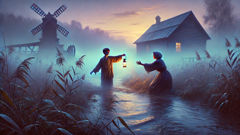
But that same dawn, as fog drifted low on the river, a child’s voice rang out near the willow grove. Kolya stumbled from the reeds, pale and shivering but alive. Vera swept him into her arms, overcome by grief and wonder. He remembered nothing—only a dream of warm hands and a lullaby sung in a language older than words.
The villagers marveled at the miracle. Some whispered that Vera’s love had called Kolya back; others said a price had been paid, though none dared ask what it was. Only Old Petrovna saw the shadow that flickered in Kolya’s eyes when dusk fell, and how he flinched at the sound of water lapping against stone.
As autumn deepened, Vera and Kolya tried to rebuild a life. Yet the cottage felt emptier than before. Kolya grew quiet and thin, his laughter rare. Sometimes he wandered to the river’s edge and stared into the current, searching for shapes in the drifting light. Vera watched him with fear, remembering the tales her mother had told—of souls returned from the water who never truly came home.
One night, Kolya vanished. Vera searched by lantern-light until dawn, her voice hoarse from calling. She found him kneeling at the bank, speaking softly to the mist. He told her a dream: of a pale old man who sat on a sunken throne and wept tears of silt, who said, “Remember me when you see the river shine.”
The seasons changed. The Volga flooded and receded, carrying away secrets and sorrow. Kolya grew into a man—a quiet fisherman with haunted eyes. He never married, nor left the village. Each year, on the anniversary of his return, he left a bundle of wildflowers by the old mill and whispered a prayer for the lost. Some say they saw him speak to shadows on the water; others swore that on certain nights, his reflection vanished from the river’s surface entirely.
The legend of the Vodyanoy changed after that autumn. People still left offerings—coins and milk and bread—but they also spoke Ivan’s name with reverence. They said his bargain had bought not only Kolya’s life, but a fragile peace for the village. And if, on misty mornings, you saw a hunched shadow sitting on a mossy log or heard a soft, grieving laugh from beneath the water, you knew to walk quietly home, carrying your losses with you. For the Volga remembers everything, and beneath its surface, every soul is weighed and counted—by spirits and men alike.
Conclusion
The Volga continues its eternal journey, threading through meadows and forests, past villages where memories linger like fog. The tale of Ivan Morozov and the Vodyanoy endures, whispered on cold nights when the river’s surface gleams with secrets. Some say it is a story about grief—how it can drive a man to bargain with spirits and give up everything for love. Others see it as a warning: to respect what lies beneath the surface, to heed the boundaries between the living and the dead. Yet in every retelling, the river is both villain and witness, its depths hiding both terror and mercy. The Vodyanoy remains—a grotesque sentinel hunched on his log, forever counting souls but sometimes moved by a sacrifice freely made. And so, the villagers keep their rituals, honoring what they cannot understand and carrying their losses gently, knowing that even in sorrow there is a kind of peace. For in Russia’s old heartland, where water shapes destiny and legends breathe in every shadow, the boundary between myth and memory is as fluid as the river itself.

